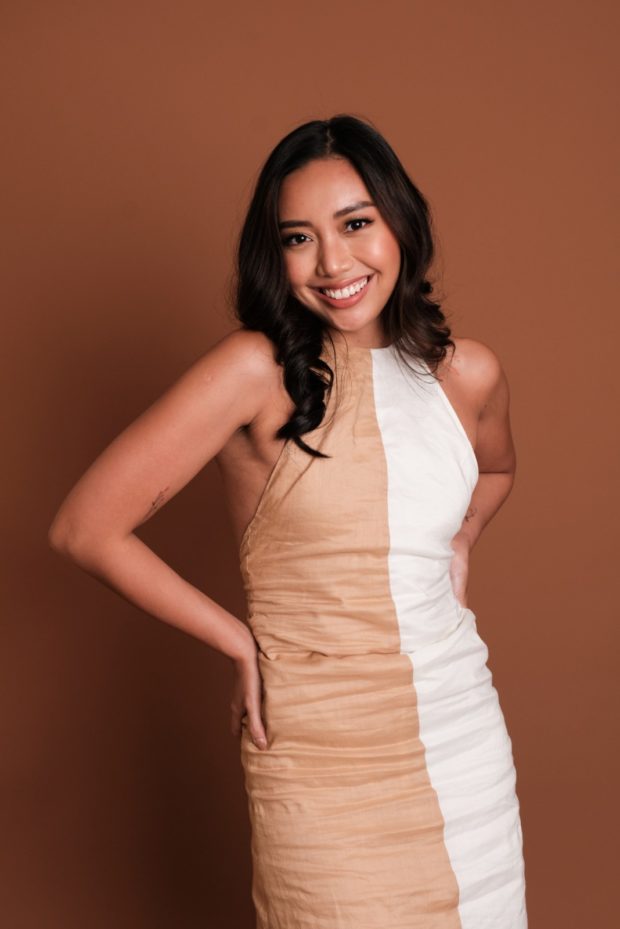This strong Filipina influencer reminds to love yourself even more in 2023
You’ve scrolled through your TikTok’s FYP and Instagram’s Explore page today, no doubt. What content has the algorithm made you ‘come across’? Memes? Kalokohan caught on cam? Dog or cat videos? Motivational quotes? We hope that, today, you come across content that makes you feel good about yourself inside and out because some of us are probably still reeling from ‘that time of the year’.
In the age of the Internet where content about self-acceptance, self-love, and affirmations on positive body image abound, many people still struggle with loving their physical forms. Amidst that difficulty, that acceptance still gets challenged – particularly around the recently-concluded holidays (and sometimes beyond), and particularly within Filipino culture.
“Tumaba ka.” A common quip from titos, titas, and ninongs and ninangs during family gatherings, typically touted as ‘harmless’ and ‘walang masama sa sinabi nila’, usually marks the beginning of conversations about toxic Filipino culture surrounding body image. Sometimes it’s the butt of jokes, sometimes it’s the trigger for conversations on deep-seated trauma brought about by weight stigma.
According to one medically-reviewed article, weight stigma refers to the “social disapproval” of people who are perceived as overweight or are affected by conditions like obesity. In the Philippines, this social disapproval may come in the form of backhanded compliments or snide comments disguised as well-meaning observations particularly from people we haven’t interacted with in a long time who may have remembered a past version of us. The issue is not about one’s weight on the scale per se. The prevalent problem is the stigma or the “judgment” surrounding it – as if gaining weight (lumobo ka!) or losing too much weight (sobrang payat mo naman, hindi na maganda!) is the end-all, be-all of a person.
How many of these have you heard this past holiday season?
When faced with this situation, sometimes you just need an ate (older sister) figure to help you talk through it, handle it with grace, and hopefully inspire you to enact change.
Ayn Bernos, content creator and staunch supporter of all things self-love, is here to help. In her newest vlog uploaded into her YouTube channel titled “How Pageantry Affected My Body Image… One Year Later,” she talks about her own struggles with body image particularly after joining the Miss Universe Philippines.
Joining the Miss Universe Philippines was a lifelong dream for Ayn, not because she wanted to flaunt herself, but because she had a message and she believed that the pageant that shone a spotlight mainly on physical beauty was the perfect platform to send it.
The video’s description, which has garnered close to 14,000 views as of this writing, reads:
Joining Miss Universe Philippines was a childhood dream come true and an opportunity of a lifetime. However, as with most dreams, they come at a cost. Today, I’d like to share with you how pageantry has affected my body image, how I’m healing, and how I’m learning to love my body again.
I hope this video enlightens anyone who aspires to become a beauty queen, encourages the pageant community to be kinder, and challenges the norms we’ve subscribed to for a long time.
I do think pageantry will always be relevant. But I hope its evolution and progress comes sooner than later for the sake of the next generation it aims to empower.
Love,
Ayn Bernos.
Every single comment on the video, which premiered last November 25, 2022, reflects how many Filipinas deeply resonated with the message, whether or not they’ve ever joined a beauty pageant.
In the video, Ayn opens up about her experience with the pageant. She shares how, before joining, she was quite content with her body – she felt beautiful and strong in her own skin. During the pageant, the demand for physical change started coming. Each ‘suggestion’ – to lose more and more weight, to get veneers to make her teeth look perfect and to slim her face down, to shave off some of her cheek ‘fat’ to look smaller in online interviews and features – chipped away at the confidence she worked hard to build for herself. The constant comparison between her and other contestants whose features were so different from hers also played a role, with Ayn saying that the features she was not even self-conscious about were constantly being thrust into the spotlight.
But Ayn maintains that amid the criticisms, she consciously worked hard to push back on those statements and stand with her values, her advocacy of making a dent in some of the country’s unrealistic beauty standards. “I wanted to finish strong. I wanted to represent well.”
After the competition, Ayn says that “that’s when the body dysmorphia really sank in.” Without the styling, the heels, and the glamour, the slow evolution of her questioning her own body began. To combat this, Ayn turned to body neutrality.
Body neutrality is defined as loving and appreciating what their bodies are capable of. This is a different concept from body positivity, which encompasses loving our bodies regardless of size, shape, color, or ability.
So why not body positivity? “That is more about celebrating our bodies. [Body neutrality] is more about existing.” As an advocate of self-love, Ayn also understands that the body will always be subject to change throughout our lifetimes. We have to be okay with that. “It does not define who we are as a person. That’s something I’m trying to embody and uphold,” she emphasizes.
With such a strong head on her shoulders, and with what she is trying to uphold, we asked Ayn if she also faced the common ‘tumaba ka’ comments or similar body image-related quips with family even after facing beastlier criticisms. Do these still affect her? “It’s been increasingly difficult having to deal with these comments, especially now that the world is opening up again and we’re reunited with our loved ones,” she admits. “I’m trying to be as vocal as I can about it though, because I believe it’s a habit we Filipinos need to break. We should be allowed to peacefully exist in our bodies and not be constantly on edge, wondering when the next “tumaba ka” comment would come.”
Ayn also admits that even though we’ve made strides in bending some unrealistic beauty stereotypes, we still have a long way to go. “I thought we’d come a long way, but if my recent comment section has taught me anything, it’s that we still need to work hard to change our society’s attitude towards diversity.”
And even after the holiday season high, YOU still have the golden opportunity to enact small but impactful changes when it comes to conversations about the way we Filipinos perceive our physical bodies. “We need to normalize having a positive conversation around it not just online, but also in our own homes because that’s where this all stems from,” Ayn reminds. “The stereotypes and harsh comments are still around because we tolerate them. We have to be more vocal, more forgiving with ourselves, and honestly, just more realistic.”
Realistic in what sense? “Focus on your own personal relationship with your body! We cannot control what others think, but we can choose how we deal with them and how we react. I am also a work-in-progress, but I am actively trying to unlearn these beauty standards so that I don’t pass the trauma on to the next generation,” Ayn also says.
Because even in this age of the Internet where content about self-acceptance, self-love, and affirmations on positive body image abound, reminders of confidence, of being kinder to yourself, of being okay with being a work in progress are still very much welcome. “I believe that confidence is contagious, and I credit my role models – friends and thought leaders alike – whose confidence and self-love inspire me,” Ayn says, speaking to the people who look for ways to consciously remind themselves to love themselves no matter the season. “Through conversations in my own circle, I’ve learned that sometimes I have that effect on others as well. I think it’s about learning to love ourselves deeply enough that others are empowered to do it, too, in their own way.”
This 2023, holiday season or not, we hope you can love your bodies all the more and empower others to do the same!
ADVT.
Read more stories here:
G-SHOCK continues aggressive expansion, opens new location in Ayala Malls Cloverleaf


